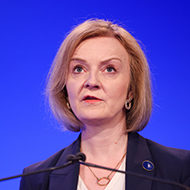Vets respond to Liz Truss becoming new Prime Minister

Liz Truss is set to be appointed as Prime Minister by the Queen.
The British Veterinary Association (BVA) is calling on the new Prime Minister to make good on the government's pledge to improve animal welfare standards and bring the Kept Animals Bill into law.
With Liz Truss set to be appointed as Prime Minister by the Queen at Balmoral today (6 September), BVA has released a statement urging Ms Truss to ensure the Kept Animals Bill 'doesn't fall by the wayside'.
The Kept Animals Bill is a long-awaited piece of legislation that aims to improve welfare standards through a variety of measures. It includes new powers to clamp down on puppy smuggling, restrictions on the export of live animals for slaughter and a ban on keeping primates as pets.
The BVA has campaigned tirelessly for action in areas covered by the Bill, but progress has been hampered by other demands on parliamentary time. The Bill is currently awaiting its third reading in the House of Commons before it can pass into the House of Lords.
BVA president Justine Shotton said: “Liz Truss has a long list of pressing issues to tackle as she takes up office as the new prime minister. Ensuring the UK retains its reputation for the highest standards in animal welfare must be a top priority, particularly as the UK continues to unpick the impacts of leaving the EU and looks for new trade opportunities.
“A vital first step is to ensure the Kept Animals Bill doesn’t fall by the wayside and continues its journey through Parliament and into law. The new legislation comprises a range of measures which will bring in significant positive change for the health and welfare of pets, livestock and wildlife in the UK.”
Dr Shotton highlighted the importance of the UK government finally cementing plans to bring the Kept Animals Bill into law.
She added: “This crucial and long-awaited piece of legislation promises to bring in a cross-species suite of measures that will improve the lives of billions of animals and mustn’t be lost in the leadership handover.”



 The latest
The latest